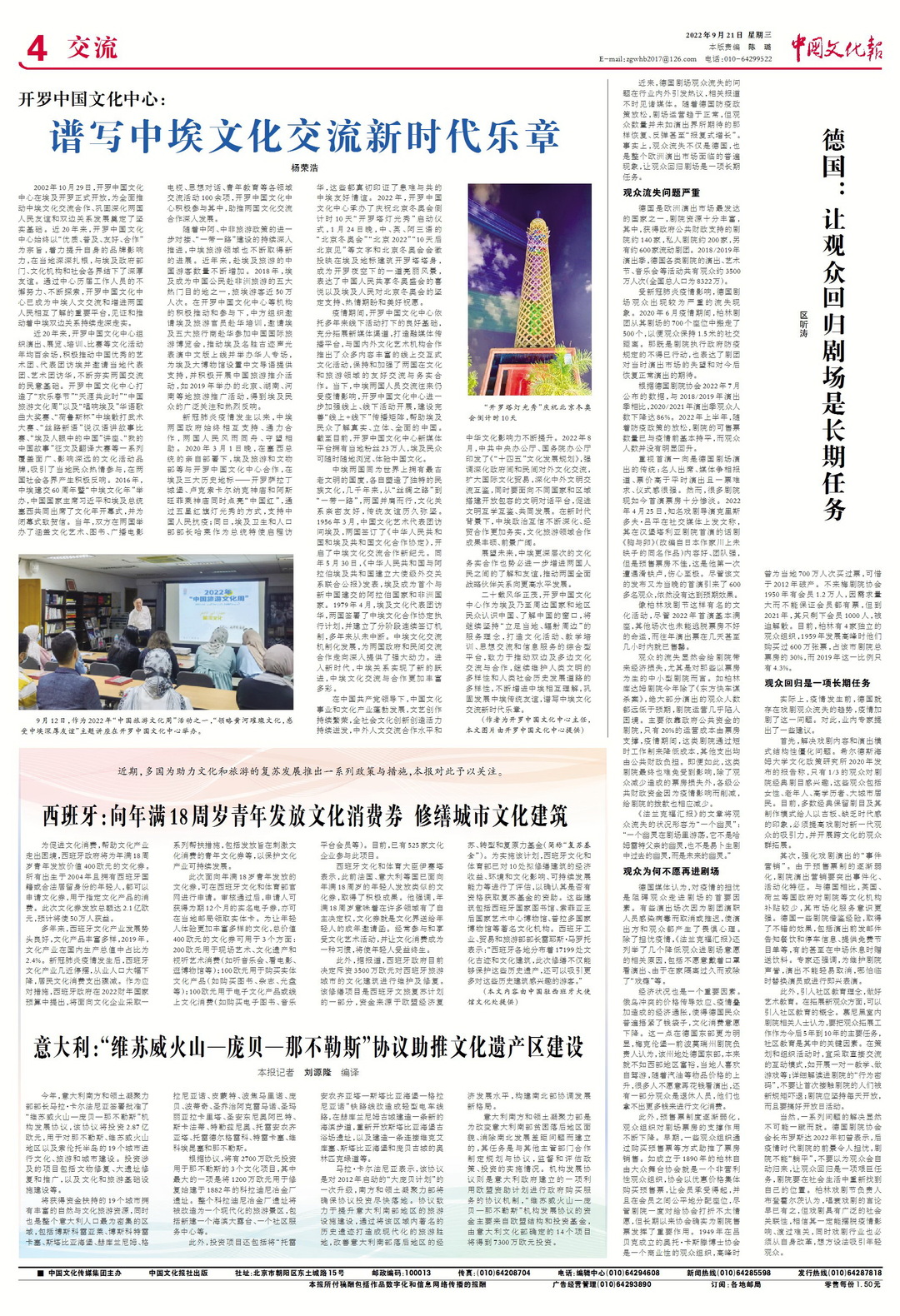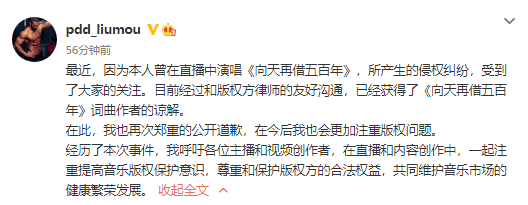Germany: Let the audience return to the theater is a long -term task
Author:Cultural Tourism China Time:2022.09.22
Recently, the problems of the loss of audiences in the German theater have caused heated discussions inside and outside the industry, and relevant reports are seen from time to time. As the German epidemic prevention policy relaxs, theater operations tend to be normal, but the number of audiences has not recovered, rebounded, and even "retaliated" as expected by the performance industry. In fact, the loss of audiences is not only Germany, but also a common phenomenon facing the entire European performance market. It is a long -term task for the audience to return to the theater.
The problem of the audience is serious
Germany is one of the most developed countries in the European performance market. The theater resources are very rich. Among them, there are about 140 theaters, about 200 private theaters supported by government public finances, and about 600 mobile theater troupes. In the 2018/2019 performance season, there were about 35 million audiences (83.22 million nationwide) performances, art festivals, concerts and other activities of various theaters in Germany.
Affected by the epidemic of new coronary pneumonia, German theater audiences have a serious loss. During the epidemic in June 2020, the Berlin drama group moved 500 from the 700 seats in its theater, so that the audience could maintain a social distance of 1.5 meters. It was not only the last resort of the theater's implementation of government epidemic prevention regulations, but also expressed the drama troupe's disappointment of the performance market at the time and the expectations of recovering normal performance in the future.
According to data released by the German Theater Association in July 2022, compared with the 2018/2019 performance season, the number of audiences in 2020/2021 fell 86%. In the first half of 2022, with the relaxation of the epidemic prevention policy, the number of tickets for the theater was basically the same as before the epidemic, and the number of audiences did not rise significantly.
The premiere has always been a tradition of the German theater performance: celebrities attending, media competing for reports, fares higher than usual performances, a hard -to -find votes, and a strong sense of ritual. However, many theaters are now in the box office very bleak. On April 25, 2022, the well -known drama director Chrisdorv Lu Ping wrote on social media that his drama "chest and egg" at the Burger Theater's premiere (adapted from Japanese writer Kawakaka's same name Works) Good content and strong team, but the pre -sale box office is not good. This is the first time he encountered Waterloo, which is extremely sad. Although the release of this article has attracted more than 600 audiences that night's premiere, and still did not achieve the expected results.
Famous cultural activities such as the Berlin Drama Festival, although the premiere in 2022 was basically full, and other games failed to escape the fate of bad box office, and the performance tickets had been sold out in a few days or even hours in previous years.
The loss of the audience will obviously bring economic losses to the theater, especially for those small and medium -sized theaters who make a living at the box office. For example, in addition to the "Oriental Express Murder Case" this year, most of the performances performed are far lower than expected, and the theater operations are almost in trouble. The theaters that mainly rely on government public funds, only 20%of the operating costs are supported by the box office. During the epidemic, this type of theater reduces the cost through a short -term working system. Other expenses are borne by public finance. Even so, such theaters will eventually be affected. In addition to the reduction of box office losses caused by the audience, public financial funds at all levels have been reduced due to the impact of the epidemic, and the funding for the theater has been reduced accordingly.
The article "Frankfurt Report" describes the situation of the audience as "a ghost": "A ghost wandering in the theater. It is not the ghost of Hamlet's father, nor the ghost in the past in Iboson, but the future ghost. "
Why does the audience reluctant to enter the theater again
German media believe that concerns about the epidemic is the primary factor that hinders the audience entering the theater. Some performances were canceled or delayed because the players' actors infected with viruses in the troupe made the performers and audiences fear. In addition to worrying about the epidemic, the Frankfurt Report also lists several reasons to reduce the willingness of the audience to enter the theater, including unwillingness to wear a mask to watch the performance, and quit "drama addiction" because of the long time of isolation at home.
Economic conditions are also an important factor. The economic inflation caused by the price conduction effect and the overlapping of the epidemic in Russia and Ukraine has made the German people generally tighten the money bags, and the willingness to cultural consumption has declined. This is even more obvious in eastern Germany. The person in charge of the Meklenburg -former Bomori Theater believes that the state is located in eastern Germany and is not as rich as the western region. Locals like to travel by themselves. With the rise, many people are unwilling to spend any more money to perform, and some audiences are retirees, and they can't get more money for cultural consumption.
In addition, the pre -sale ticketing system has gradually weakened, and the audience has continued to decline in support for theater box office. In the early days, some audiences helped box office sales by purchasing pre -sale tickets. For example, the Berlin Free Volkswagen Stage Association, which was established in 1890, is a non -profit audience organization. The association collectively purchases pre -sale tickets at a preferential price to afford members and assign seats between members. The association's discount is not willing, but the association has indeed played an important role in the theater ticket sales for a long time. In 1949, Dr. Otto Kasten, established in Lubak, was a commercial audience organization. He bought a vote for 7 million local people during the peak, but unfortunately bankruptcy in 2012. In 1950, there were 12,000 members in the Budi Mei Theater Association. Due to the large demand, members could not guarantee that members had votes. However, by 2021, there were only 1,000 members and forced to dissolve. At present, there are four independent audience organizations in Berlin. They purchased 6 million tickets during the peak of development in 1959, accounting for 30%of the total box office of the city theater. In 2019, this proportion was only 4.3%. The return of the audience is a long -term task
In fact, before the epidemic occurred, Germany had a trend of losing the drama audience, and the epidemic exacerbated this problem. In this regard, industry experts have made some suggestions.
First, solve the problem of rigidity of drama content and performance mode. The report released by the Institute of Cultural Policy of Hildezheim University in the Institute of Cultural Policy stated that only one -third of the audience was interested in the classic theaters of theater. These audiences include women, elderly people, highly educated people, and residents of large cities. At present, most classic reserved repertoires and their production model gives people an impression of ancient boards and lack of sense of the times. It is necessary to enhance the attractiveness of drama to the new generation of audiences and carry out cross -cultural audiences to expand.
Secondly, strengthen the "event marketing" of drama performances. Due to the gradual weakening of the pre -sale ticket system, the theater's performance marketing should highlight the events and activity characteristics. Compared with Germany, the British, the Netherlands and other countries have less subsidized subsidies such as theater and other cultural institutions, and their market -oriented service awareness is stronger. Some German theater learned from experience and achieved good results, including sending emails before the performance to inform catering and parking information, provided free program lists, etc. Some even gave drinks during the midfield rest. Experts also emphasized that in order to maintain the reputation of the theater, the performance cannot be easily canceled, even if it is temporarily replaced with actors or improvisation.
In addition, introduce the concept of community education and do a good job of art education. In terms of expanding new audiences, the concept of community education can be introduced. Relevant sources of the Munich's indoor theater believes that the expansion of the audience should be used as the main task of the next five to 10 years, and community education is one of the key factor. When planning and organizing activities, you should adopt a direct interactive mode of communication, such as one -on -one teaching, doing games, etc.; Detailed interpretation of the "behavioral password" of entering the theater. You should insist on opening up every day, and you must do a good job of open day activities.
Of course, the solution of a series of problems is obviously impossible to achieve overnight. The President of the German Theater Association, Broasda, stated in early 2022 that the prospects of the post -epidemic era Theater are worrying. The theater cannot be "lying down". Don't think that the audience will return automatically. Re -find your own position in life. Budden Holz, the head of the Berlin Drama Festival, believes that the remarks of the dramatic drama have already existed, but the drama has a wide range of social correlations. , Try to attract young audiences.
"China Culture News" on September 21, 2022
The 4th version published a special report
"Germany: Let the audience return to the theater is a long -term task"
↓ ↓ ↓ ↓ ↓ according to
Editor -in -chief: Chen Xiaoyue

- END -
"What to do! Talk Show Special" and Wang Jingyin Tan Fei: I am far from the filmmaker talk show on the ceiling

Cover reporter Wu Deyu Xun ChaoThe popular variety show What to do! Talking Show S...
"The anchor sang a song and was claimed 100,000."

The well -known anchor PDD posted on July 7 that recently, because I had sang Borr...